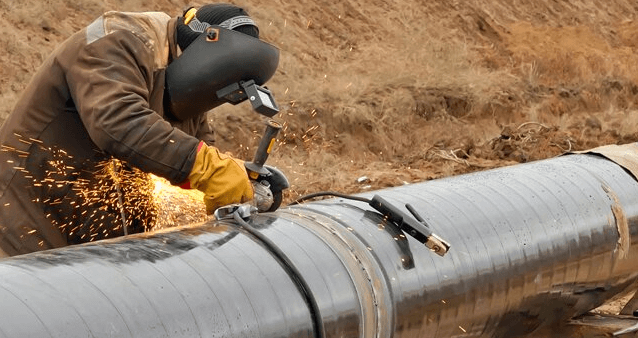Why should you pipe weld?
It is not easy to simply become a pipe welder. It takes training, experience and a lot of learning from your mistakes to become successful and trained in this industry. Why put yourself through that? The experience needed to be a good pipeline welder means there’s relatively few pipeline welders compared to the amount of work needing to be done. This ensures being a pipe welder is good for job security.
Read on to find how to become a pipe welder, the benefits and the difficulties in working in this industry and what industries you could work in as a pipe welder.
There is no same day in the life of a pipeline welder (depending on the industry you specifically work in). Jobs often require that you weld the pipe at the location they are situated, rather than staying in a workshop all day. You could be welding pipe surrounded by snow-covered mountains or deep underground.
Naturally, one of the biggest selling point tends to be the pay. The average pipeline welder rakes in anywhere from £21,000 to £48,000 a year depending on the industry and location. On top of that, the benefits available to pipeline welders either from employers, unions or other organizations are nothing to smirk at.
What Does It Take to Be A Pipeline Welder?
Firstly, pipeline welding can be physical demanding. Projects can be strenuous and there are times when you have to weld in incredibly awkward positions, using only shear strength and willpower to keep your torch steady. Like many welding jobs done outside a workshop, you could be working in a variety of conditions, both temperature-wise and in terms of location. You could even be working with sewers where overcoming your gag reflex is a vital skill. Maintaining fitness and strength, therefore, is important in ensuring you are able to work in these different conditions successfully and safely.
When becoming a certified pipe welder, it is best to go down the route of formal training. Unless you know a welder who is willing to teach you, this is the most secure way of progressing and learning the necessary skills.
Besides certification, the other challenge is getting job experience. Even with certification, most employers won’t hire you on as a full-blown pipeline welder unless you have gained relevant work experience in the industry. To get that experience, many pipeline welders start as an assistant to a veteran pipe welder. It is recommended that you do this in order to become more employable when you are fully certified – you will also pick up vital skills from other pipe welders to further your training.
When do you have enough certification and experience to become a pipe welder on your own? Most of the time that depends on your potential employers. Some companies will be willing to hire newer pipe welders while others are looking for veterans. There is never a guaranteed set time, but as mentioned above, it is recommended to have some work experience to be given a better chance at being employed by companies.
What industries can I work in?
While the natural gas and oil companies do hire a large amount of pipeline welders, those aren’t the only industries you can work in. For instance, water and sanitation services have plenty of pipes that will need. The construction industry also deals with a large amount of piping that all requires the experienced touch of a pipeline welder.
Because so many industries need pipeline welders, it’s possible to find a job where you aren’t expected to travel very often. However, there are jobs for pipeline welders where some travel is required. If you’ve always wanted to see the world, it’s an excellent opportunity.
As mentioned above, not every pipeline welding path follows the same mould. Therefore, it is recommended to make sure you look at the different industries and see which suits you.
At PCES we are renowned worldwide suppliers of pipe handling, preparation, alignment, cutting and bevelling machines. We also stock a wide range of welder protection, welding supplies and general tools. We supply international companies in the construction, petrochemical and pipeline industries.
As well as pipeline welding supplies, we stock a range of pipeline construction equipment including welding power tools. PCES Limited offer the solutions to make jobs more accurate and more efficient.
